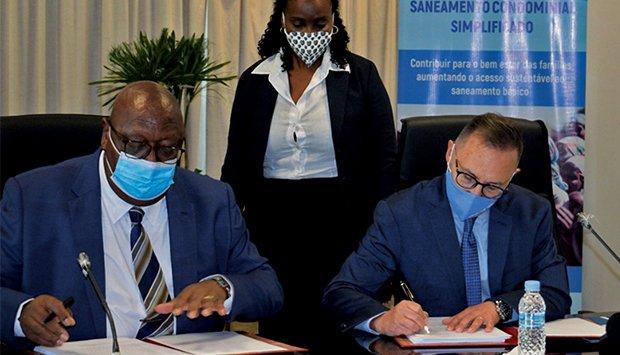Africa-Press – Angola. An agreement to improve sanitation in communities in the municipality of Viana, in Luanda province, was signed this Monday between the Ministry of Culture, Tourism and Environment and the United Nations Children’s Fund (Unicef).
Through the government body, Minister Filipe Zau signed the agreement, worth one million dollars, lasting one year and to be implemented in four phases. On the part of Unicef, the organization’s representative in Angola, Ivan Yerov, did so.
The Secretary of State for the Environment, Paula Coelho, stressed that the agreement will bring greater community environmental awareness and a more comprehensive implementation of national sanitation strategies.
According to the Secretary of State, the pilot program will be implemented in Viana, as it is a city with a high population density. He said that the project is based on social engineering, combining innovative construction technologies with community and local authority involvement in the implementation of simplified sanitary sewage systems, waste management and promotion of actions to improve public health.
“This strategy aims to frame condominium sanitation as one of the solutions for peri-urban areas that do not have access to sanitation, it allows, in a practical way, to improve the environmental quality in these areas, to improve the prevention of preventable diseases and to create aimed at education and sustainable development”, he pointed out.
The official said that, despite numerous efforts made over the years, it is recognized that, in terms of sanitation, there continues to be an enormous challenge to overcome, and other aspects have to be considered. He gave as an example population growth, territorial planning, the adequacy of infrastructure for the operation of sanitation itself, the lack of compliance with standards, the deficit of human and financial resources and the lack of environmental awareness of citizens.
“Accordingly, the Executive has referred substantially to the need to reverse this situation, prioritizing sanitation in the context of the national policy aligned with the 2030 Agenda, namely, to its Sustainable Development objective number 6, ‘Water for all’, which aims to achieve, by 2030, access to adequate and equitable sanitation and hygiene for all”, he explained.
Paula Coelho highlighted that the Government Program 2017-2022 and the National Development Plan (PDN)-2018-2022 integrate community-led total sanitation as a strategy to be used to improve sanitation coverage and improve hygiene compliance with citizens.
The Secretary of State also said that the project will be implemented in defined areas with the support of the Provincial Government of Luanda, in cooperation with local authorities, and may be replicated in the future in other locations.
Partnership
The financing is a partnership between the Governments of India, South Africa and Brazil, which will start in the coming days, said, for his part, the UNICEF representative in Angola, Ivan Yerov. Being a pilot project, he added that it is necessary to develop it and share information with the communities with which they will work.
Ivan Yerov highlighted the importance of community participation for the development of the project and the citizens’ sense of ownership, requiring a participatory methodology, a more economical sanitation alternative for the communities.
The ambassador of Brazil, Rafael de Melo Vidal, said that his country has cooperation with Angola and, depending on the experiences developed by Brazil in recent decades, these challenges can lead to the development of this cooperation.
For More News And Analysis About Angola Follow Africa-Press






